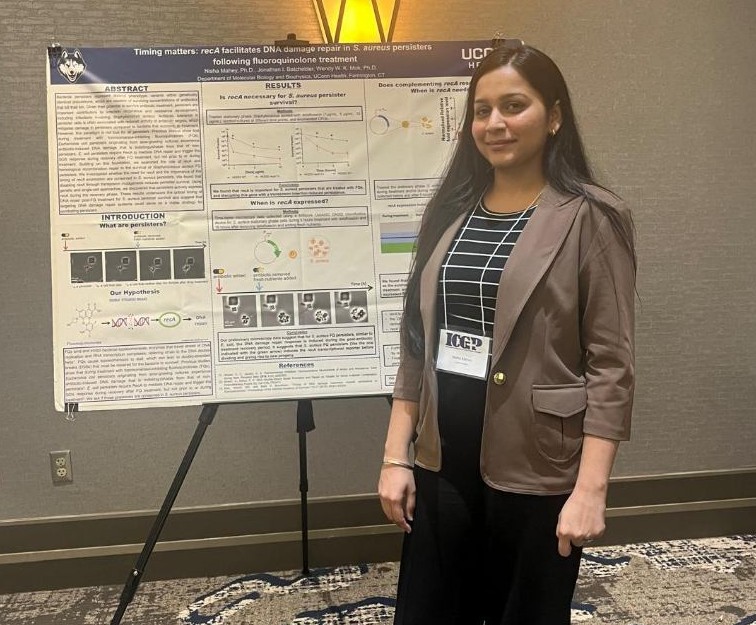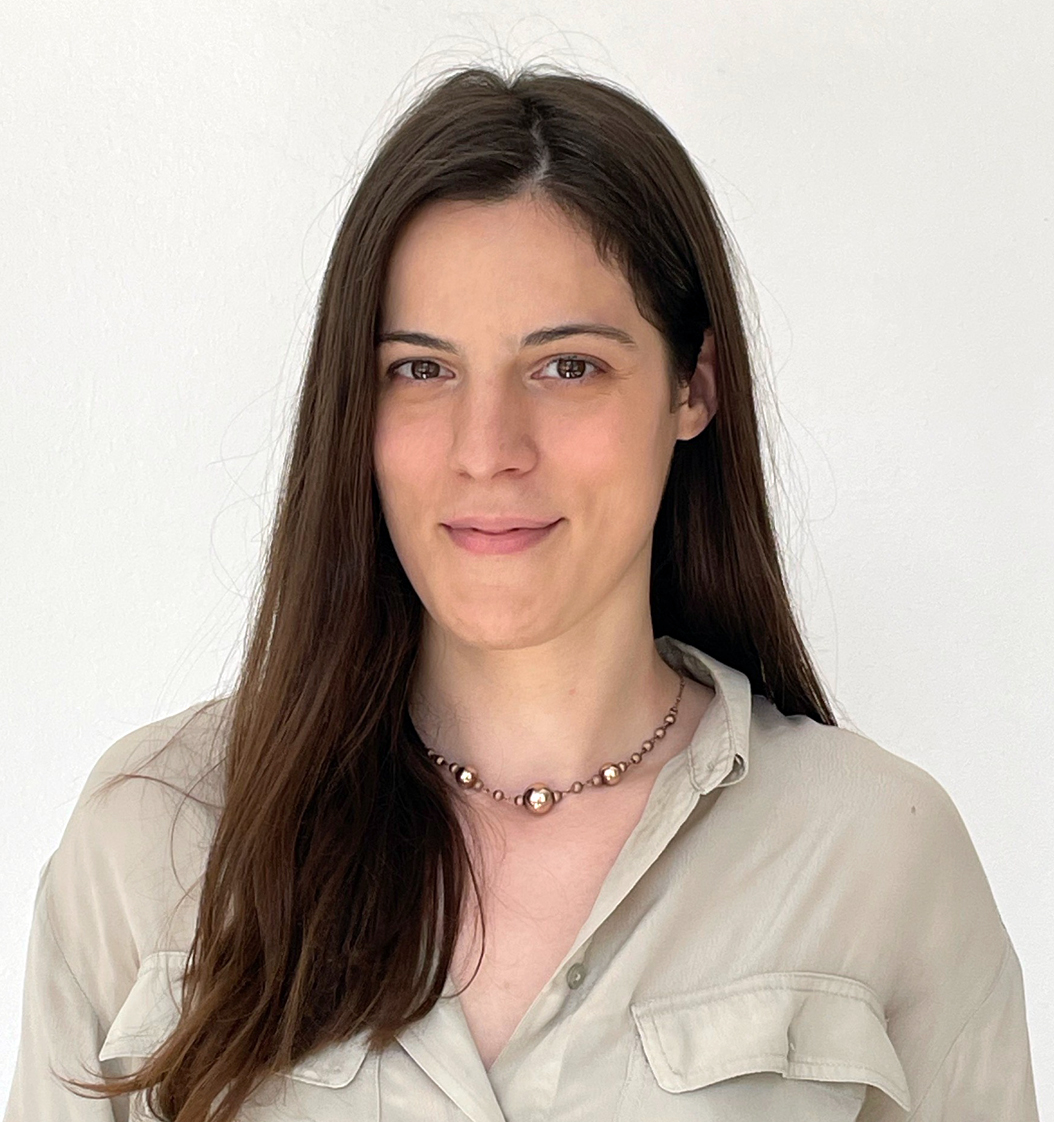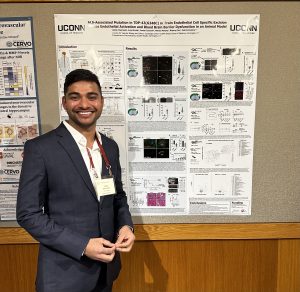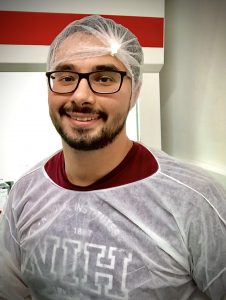Emilie Korchak – Bezsonova Lab of the Department of Molecular biology and biophysics
Posted on January 29, 2026
 Emilie Korchak is a postdoctoral fellow in Bezsonova Lab. Together, they are studying Hao-Fountain syndrome, an ultra-rare neurodevelopmental disorder caused by mutations in the USP7 gene. Children with this condition experience speech delays, behavioral challenges, and neurological abnormalities. Uncovering how disease-causing USP7 mutations alter cellular function could lead to new therapeutic strategies. There are no treatments for Hao–Fountain syndrome. Dr. Korchak is among 10 rare disease researchers in the country who will receive a $20,000 research grant. The grant is from Uplifting Athletes, a nonprofit organization that unites student-athletes nationwide and professional athlete ambassadors with their local rare disease communities. Together, they aim to raise awareness, inspire hope, and generate funds to support the approximately 1 in 10 Americans impacted by rare diseases. The program has awarded more than $1.2 million in grants have been awarded since its inception in 2007. Dr. Korchak will accept the grant at Uplifting Athletes’ Young Investigator Draft, Jan. 31 at Lincoln Financial Field in Philadelphia.
Emilie Korchak is a postdoctoral fellow in Bezsonova Lab. Together, they are studying Hao-Fountain syndrome, an ultra-rare neurodevelopmental disorder caused by mutations in the USP7 gene. Children with this condition experience speech delays, behavioral challenges, and neurological abnormalities. Uncovering how disease-causing USP7 mutations alter cellular function could lead to new therapeutic strategies. There are no treatments for Hao–Fountain syndrome. Dr. Korchak is among 10 rare disease researchers in the country who will receive a $20,000 research grant. The grant is from Uplifting Athletes, a nonprofit organization that unites student-athletes nationwide and professional athlete ambassadors with their local rare disease communities. Together, they aim to raise awareness, inspire hope, and generate funds to support the approximately 1 in 10 Americans impacted by rare diseases. The program has awarded more than $1.2 million in grants have been awarded since its inception in 2007. Dr. Korchak will accept the grant at Uplifting Athletes’ Young Investigator Draft, Jan. 31 at Lincoln Financial Field in Philadelphia.
Nisha Mahey – Wendy Mok Lab of the Department of Molecular Biology and Biophysics
Posted on November 13, 2025
 Nisha Mahey is a postdoctoral fellow in Wendy Mok Lab. She presented her poster titled “Damage repair in Staphylococcus aureus fluoroquinolone persisters” at the 15th Cold Spring Harbor Laboratory Meeting on Microbial Pathogenesis & Host Response, (September 8–12, 2025). Dr. Mahey’s participation in this meeting was supported in part by the American Society for Microbiology’s Career Development Grant for Postdoctoral Women.
Nisha Mahey is a postdoctoral fellow in Wendy Mok Lab. She presented her poster titled “Damage repair in Staphylococcus aureus fluoroquinolone persisters” at the 15th Cold Spring Harbor Laboratory Meeting on Microbial Pathogenesis & Host Response, (September 8–12, 2025). Dr. Mahey’s participation in this meeting was supported in part by the American Society for Microbiology’s Career Development Grant for Postdoctoral Women.
Dr. Mahey’s research focuses on how bacterial persisters survive lethal antibiotic treatments and contribute to infection relapse. She utilizes diverse genetic and single-cell genetic, single-cell, and multi-omics approaches to uncover the mechanisms and factors influencing antibiotic persistence in single cells and bacterial communities. The overarching goal is to develop effective strategies to tackle the problem of antibiotic treatment failure and resistance development.
Nisha Mahey – Wendy Mok Lab of the Department of Molecular Biology and Biophysics
Posted on November 01, 2024
 Nisha Mahey is a postdoctoral fellow in Wendy Mok Lab. She presented her poster titled “Timing matters: recA facilitates DNA damage repair in S. aureus persisters following fluoroquinolone treatment” at the 2024 International Conference on Gram-Positive Pathogens held at the University of Nebraska Medical Center (UNMC), (October 13–16, 2024).
Nisha Mahey is a postdoctoral fellow in Wendy Mok Lab. She presented her poster titled “Timing matters: recA facilitates DNA damage repair in S. aureus persisters following fluoroquinolone treatment” at the 2024 International Conference on Gram-Positive Pathogens held at the University of Nebraska Medical Center (UNMC), (October 13–16, 2024).
The presentation focused on uncovering how Staphylococcus aureus persisters survive antibiotic treatment particularly fluoroquinolones cause DNA double strand breaks. She investigated the mechanism of persister survival in response to fluoroquinolone treatment using diverse genetic and single-cell techniques.
Katarina Milicevic – Antic Lab of the Department of Neuroscience
Posted on March 4, 2024
 Katarina Milicevic is a postdoctoral fellow in Antic Lab. Her article titled ‘Plateau depolarizations in spontaneously active neurons detected by calcium or voltage imaging” was published in Scientific Reports. In the featured publication, Dr. Milicevic and co-authors investigate the relationship between neuronal electrical activity and optical signals detected by calcium and voltage imaging. Calcium imaging is a crucial and widely used tool in modern systems neuroscience for monitoring neuronal activity. Typically, researchers assume that calcium transients reflect action potential firing. However, new findings by Milicevic et al. reveal that the strongest optical signals are generated when an action potential occurs on top of a plateau potential. Additionally, their research shows that even subthreshold electrical events—those without any action potentials—can produce noticeable calcium transients in optical recordings. These novel insights should be carefully considered when interpreting calcium imaging data.
Katarina Milicevic is a postdoctoral fellow in Antic Lab. Her article titled ‘Plateau depolarizations in spontaneously active neurons detected by calcium or voltage imaging” was published in Scientific Reports. In the featured publication, Dr. Milicevic and co-authors investigate the relationship between neuronal electrical activity and optical signals detected by calcium and voltage imaging. Calcium imaging is a crucial and widely used tool in modern systems neuroscience for monitoring neuronal activity. Typically, researchers assume that calcium transients reflect action potential firing. However, new findings by Milicevic et al. reveal that the strongest optical signals are generated when an action potential occurs on top of a plateau potential. Additionally, their research shows that even subthreshold electrical events—those without any action potentials—can produce noticeable calcium transients in optical recordings. These novel insights should be carefully considered when interpreting calcium imaging data.
Rogie Royce Carandang – Cunningham Lab of the Department of Public Health Sciences
Posted on January 14, 2025
 Rogie Royce Carandang, a postdoctoral fellow in Cunningham Lab, has been named a 2024 Outstanding Author by the Journal of Public Health and Emergency (JPHE). He is recognized for making outstanding contributions to the journal and immense efforts in research. Carandang’s research focuses on Maternal and Child Health (MCH) and Gerontology. His accomplishment is highlighted in UConn Today: https://today.uconn.edu/2025/01/outstanding-author/
Rogie Royce Carandang, a postdoctoral fellow in Cunningham Lab, has been named a 2024 Outstanding Author by the Journal of Public Health and Emergency (JPHE). He is recognized for making outstanding contributions to the journal and immense efforts in research. Carandang’s research focuses on Maternal and Child Health (MCH) and Gerontology. His accomplishment is highlighted in UConn Today: https://today.uconn.edu/2025/01/outstanding-author/
His most recent publications in the JPHE journal include:
-
-
-
-
- Meneses PD, Dino AB, Mendez KZ, Mendoza K, Molina MJ, Miranda KJ, Carandang RR. Facilitators of and barriers to accessing prenatal care services in primary healthcare facilities during the COVID-19 pandemic in Manila, Philippines: a qualitative study. Journal of Public Health and Emergency, 2024. https://jphe.amegroups.org/article/view/9780
- Lagarde MA, Mallare G, Panaligan GS, Kakazu DG, Alegado-Bagaoisan D, Miranda KJ, Carandang RR. Parenting experience and behavioral changes in children diagnosed with autism spectrum disorder during the implementation of the new normal in Metro Manila, Philippines. Journal of Public Health and Emergency, 2024. https://jphe.amegroups.org/article/view/10363
-
-
-
Wenquiang Du – Kshitiz Lab of the BioMedical Engineering-SODM
Posted on October 01, 2024
 Wenqiang Du, a postdoctoral fellow in Kshitiz Lab, has a new first-authored article titled Scar matrix drives Piezo1 mediated stromal inflammation leading to placenta accreta spectrum” published in the journal Nature Communications. This groundbreaking research was conducted in collaboration with an OBG group led by Molly Brewer, Melinda Sanders, Gavin Nicole, Jennifer Jorgensen, and Christopher Morosky, as well as Reinaldo Figueora in Trinity Health, Hartford.
Wenqiang Du, a postdoctoral fellow in Kshitiz Lab, has a new first-authored article titled Scar matrix drives Piezo1 mediated stromal inflammation leading to placenta accreta spectrum” published in the journal Nature Communications. This groundbreaking research was conducted in collaboration with an OBG group led by Molly Brewer, Melinda Sanders, Gavin Nicole, Jennifer Jorgensen, and Christopher Morosky, as well as Reinaldo Figueora in Trinity Health, Hartford.
Cesarean surgeries are on the rise, and with that the frequency of placenta accreta. Placenta accreta occurs when the placenta invades very deeply into the mother’s uterus, sometimes into the abdomen. The only solution at the time of birth is to remove the entire uterus. This is a very rapidly rising disease but there is limited understanding of the mechanisms causing it.
Kshitiz Lab, also known as the Evolutionary Medicine Group, found a key mechanism driving this pathology. They questioned a long-held dogma that the scar from a previous cesarean cut provided a “path” for placental cells to deeply invade the uterus. They surmised that if there is an empty path, mother’s own cells should have traversed it. They have shown that the scar transforms the decidua (uterus stroma) into an inflammatory state by activating a mechanosensory calcium channel, Piezo1. This inflammatory state results in production of molecules which attract placental cells towards the scar in a rapid fashion leading to accreta. This paper is one of the first mechanistic works describing the pathology.
Rogie Royce Carandang – Cunningham Lab of the Department of Public Health Sciences
Posted on September 24, 2024
 Rogie Royce Carandang, a postdoctoral fellow in Cunningham Lab, has achieved a remarkable feat by publishing five papers on group prenatal care, four of which were published in 2024. Rogie has demonstrated his commitment to advancing maternal and child health while addressing health inequities and disparities. His work spans various fields, including implementation science, community-based participatory action research, and global health. He is highly skilled in both quantitative and qualitative research, with extensive experience in analyzing large datasets and managing clinical trials. Moreover, Rogie is passionate about teaching, sharing knowledge, and making a meaningful impact on individuals and communities.
Rogie Royce Carandang, a postdoctoral fellow in Cunningham Lab, has achieved a remarkable feat by publishing five papers on group prenatal care, four of which were published in 2024. Rogie has demonstrated his commitment to advancing maternal and child health while addressing health inequities and disparities. His work spans various fields, including implementation science, community-based participatory action research, and global health. He is highly skilled in both quantitative and qualitative research, with extensive experience in analyzing large datasets and managing clinical trials. Moreover, Rogie is passionate about teaching, sharing knowledge, and making a meaningful impact on individuals and communities.
-
-
-
-
- Carandang RR, Epel E, Radin R, Lewis J, Ickovics J, Cunningham S. Association between mindful and practical eating skills and eating behaviors among racially diverse pregnant women in four selected clinical sites in the United States. Nutr Health 2024. https://doi.org/10.1177/02601060241246353
- Masters C, Lewis JB, Hagaman A, Thomas JL, Carandang RR, Ickovics JR, Cunningham SD. Discrimination and perinatal depressive symptoms: The protective role of social support and resilience. J Affect Disord 2024, 354, 656-661. https://doi.org/10.1016/j.jad.2024.03.039
- Masters C, Carandang RR, Lewis JB, Hagaman A, Metrick R, Ickovics JR, Cunningham SD. Group prenatal care successes, challenges, and frameworks for scaling up: a case study in adopting health care innovations. Implement Sci Commun 2024;5(1):20. https://doi.org/10.1186/s43058-024-00556-1
- Cunningham S, Carandang RR, Boyd L, Lewis J, Ickovics J, Rickey L. Psychosocial factors associated with lower urinary tract symptoms one year postpartum. Int. J. Environ. Res. Public Health, 2024; 21(1),40. https://doi.org/10.3390/ijerph21010040
- Carandang RR, Epel E, Radin R, Lewis J, Ickovics J, Cunningham S. Perceived stress and depressive symptoms are associated with emotional eating but not nutritional intake during pregnancy: a prospective cohort study. J Midwifery Womens Health 2023. https://doi.org/10.1111/jmwh.13537
-
-
-
Jessica Flori – Zajac Lab of the Calhoun Cardiology Center
Posted on September 16, 2024
 Jessica Florida, T32 postdoctoral fellow in Zajac Lab, is a recipient of NIH Clinical Research Loan Repayment Program for Individuals from Disadvantaged Backgrounds (L32) from the National Institute on Alcohol Abuse and Alcoholism. She is passionate about understanding how substance use interventions work and how substance use behaviors are maintained. With her work, her goal is to improve substance use treatment for all individuals, especially those at risk for experiencing less positive outcomes.
Jessica Florida, T32 postdoctoral fellow in Zajac Lab, is a recipient of NIH Clinical Research Loan Repayment Program for Individuals from Disadvantaged Backgrounds (L32) from the National Institute on Alcohol Abuse and Alcoholism. She is passionate about understanding how substance use interventions work and how substance use behaviors are maintained. With her work, her goal is to improve substance use treatment for all individuals, especially those at risk for experiencing less positive outcomes.
NIH extramural Clinical Research Loan Repayment Program for Individuals from Disadvantaged Backgrounds offers the repayment of educational loan debt to qualified health professionals from disadvantaged backgrounds and agree to conduct clinical research. The program provides for the repayment of up to $50,000 annually of a researcher’s qualified educational debt in return for a commitment to engage in NIH mission-relevant research.
Ashok Cheemala – Murphy Lab of the Center for Vascular Biology
Posted on September 11, 2024
 Ashok Cheemala, a postdoctoral fellow in Murphy Lab, received the Best Poster Awards for presenting groundbreaking research on endothelial TDP-43 dysfunction and its role in blood-brain barrier defects in ALS/FTD models. His work received prominent recognition at two leading conferences, Barriers of the CNS Gordon Research Conference held at Colby-Sawyer College in New London, New Hampshire, and the Cold Spring Harbor Brain Barriers Conference in Long Island, New York; underscoring the growing excitement and critical acclaim surrounding his research. This has even garnered international attention in the Eenadu Newspaper, a prominent Indian daily, with features in both April 2023 and June 2024.
Ashok Cheemala, a postdoctoral fellow in Murphy Lab, received the Best Poster Awards for presenting groundbreaking research on endothelial TDP-43 dysfunction and its role in blood-brain barrier defects in ALS/FTD models. His work received prominent recognition at two leading conferences, Barriers of the CNS Gordon Research Conference held at Colby-Sawyer College in New London, New Hampshire, and the Cold Spring Harbor Brain Barriers Conference in Long Island, New York; underscoring the growing excitement and critical acclaim surrounding his research. This has even garnered international attention in the Eenadu Newspaper, a prominent Indian daily, with features in both April 2023 and June 2024.
Dr. Cheemala’s research focuses on understanding the role of endothelial dysfunction in contributing to blood-brain barrier (BBB) defects in neurodegenerative diseases, particularly Amyotrophic Lateral Sclerosis (ALS) and Frontotemporal Dementia (FTD). He uses mouse models to investigate how the loss of TDP-43, a key protein, in brain endothelial cells, increases BBB permeability. The studies have demonstrated that mutations in the TDP-43 gene, specifically the TARDBP G348C variant, lead to endothelial cell dysfunction. This causes disruptions in tight junction proteins and cytoskeletal organization, resulting in vascular leakage and promoting neuroinflammatory responses, such as microglial and astrocyte activation—critical hallmarks of neurodegenerative disease progression.
Dr. Cheemala’s has two papers with pre-prints on BioRxiv which are now under review at Nature Neuroscience and Science Advances. His work has important implications, showing that endothelial TDP-43 dysfunction plays a critical role in ALS/FTD progression. This suggests potential avenues for therapeutic intervention targeting the BBB in these diseases.
Puja Kumari – Rathinam Lab of the Department of Immunology
Posted on December 14, 2023
 Puja Kumari, a postdoctoral fellow in Rathinam Lab, has a new first-authored article titled ‘Host extracellular vesicles confer cytosolic access to systemic LPS licensing non-canonical inflammasome sensing and pyroptosis’ published in the journal Nature Cell Biology. In her study, she identified extracellular vesicles (EVs) secreted by host cells capture circulating bacterial ipopolysaccharide (LPS) and escort it to the cytosol of cells enabling non-canonical inflammasome sensing and cell death. The findings from this study provide insights into cytosolic immune surveillance of systemic microbial products.
Puja Kumari, a postdoctoral fellow in Rathinam Lab, has a new first-authored article titled ‘Host extracellular vesicles confer cytosolic access to systemic LPS licensing non-canonical inflammasome sensing and pyroptosis’ published in the journal Nature Cell Biology. In her study, she identified extracellular vesicles (EVs) secreted by host cells capture circulating bacterial ipopolysaccharide (LPS) and escort it to the cytosol of cells enabling non-canonical inflammasome sensing and cell death. The findings from this study provide insights into cytosolic immune surveillance of systemic microbial products.
Rafael Ricci de Azevedo – Kailasan Vanaja Lab of the Department of Immunology
Posted on August 21, 2023
 Rafael Ricci de Azevedo, a postdoctoral fellow in Kailasan Vanaja Lab, was awarded the 2023 AAI Careers in Immunology Fellowship to support his work on the mechanism of Shiga toxin-mediated cell dealth. The project is entitled, “Mechanisms of Shiga toxin-mediated cell death”.
Rafael Ricci de Azevedo, a postdoctoral fellow in Kailasan Vanaja Lab, was awarded the 2023 AAI Careers in Immunology Fellowship to support his work on the mechanism of Shiga toxin-mediated cell dealth. The project is entitled, “Mechanisms of Shiga toxin-mediated cell death”.
The AAI Careers in Immunology Fellowship Program supports the career development of young scientists by providing eligible PIs with one year of salary support for a trainee in their labs. AAI awarded 13 fellowships in 2023.
Binshen Wang – Xu Lab of the UConn Center of Aging
Posted on December 20, 2022
 Binsheng Wang, a postdoctoral fellow in Xu Lab, received a prestigious $60,000 Glen Foundation for Medical Research Postdoctoral Fellowship in Aging Research by the American Federation for Aging Research and the Glenn Foundation for Medical Research. He is just one of nine postdoctoral fellows to be selected nationally for his work on p21 highly expressing senescent cells.
Binsheng Wang, a postdoctoral fellow in Xu Lab, received a prestigious $60,000 Glen Foundation for Medical Research Postdoctoral Fellowship in Aging Research by the American Federation for Aging Research and the Glenn Foundation for Medical Research. He is just one of nine postdoctoral fellows to be selected nationally for his work on p21 highly expressing senescent cells.
According to him, chronological age is the leading risk factor for most chronic diseases, frailty, and mortality worldwide. Older adults often have multiple chronic conditions at the same time, resulting in reduced health and reduced quality of life. This is why his research aims to characterize the role and mechanisms of p21Cip1-highly-expressing (p21high) senescent cells in lifespan and healthspan. He has generated and validated a new p21-Cre transgenic mouse model, and he will use this model to investigate whether clearance of p21high cells in mice could reduce frailty index, extend lifespan, and more importantly, improve physical function at the end of life.
The Glenn Foundation for Medical Research, in partnership with the American Federation for Aging Research, created the Glenn Foundation for Medical Research Postdoctoral Fellowships in Aging Research to encourage and further the careers of postdoctoral fellows who are conducting research in the basic biology of aging, as well as translating advances in basic research from the laboratory to the clinic. The award is intended to provide significant research and training support to permit these postdoctoral fellows to become established in the field of aging.